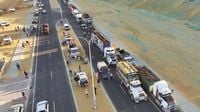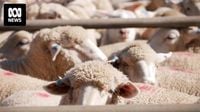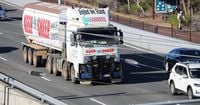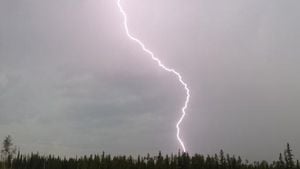Farmers and supporters rallied in Perth on March 28, 2025, protesting against the Federal Government's impending ban on live sheep exports. The demonstration, dubbed "Keep the Sheep," saw hundreds of farmers and truck drivers participating in four convoys that departed from Bedfordale, Mundijong, Neerabup, and Fremantle at 7:30 AM, making their way through the city to raise awareness about the potential economic impacts of the ban.
With the Albanese Labor government legislating the end of live sheep exports by sea to take effect on May 1, 2028, farmers are increasingly concerned about the ramifications for their livelihoods. According to the Australian Live Exporters’ Council, the industry shutdown will result in the loss of approximately 3,000 jobs in Western Australia alone. The protests aimed to send a clear message to all political parties that farmers want the decision to ban the industry overturned.
Campaign organizer Ben Sutherland emphasized the peaceful nature of the protests, stating, "We are professional and organize our events to be peaceful, safe and focused on our message." He noted that the group had gained respect for their conduct and aimed to raise awareness about the severe consequences the ban could have on the agricultural sector.
As the convoys made their way through Perth's major arterial roads, many drivers reported minimal disruption, with some noting that the traffic was better than usual. One local remarked, "I saw a few vans but Mounts Bay Road and the freeway were fine. It was the best traffic in a while." Another added that there was "zero congestion," allowing for quicker commutes.
Among the participants was Miling sheep farmer Michelle Barnard, who traveled 200 kilometers to join the protest with her seven-year-old son, Kieran. Barnard expressed her concerns about the ban's impact, predicting that she would lose 25 percent of her income if the legislation goes into effect. "Farmers in rural communities have had enough. The effect of this ban will be devastating," she said. "All we want to do is get on and farm, and put food on people’s tables." Kieran, holding a sign, proudly declared, "I want to be a farmer and a livestock truck driver."
The protest also attracted livestock truck drivers like Mick Tierney, who made the 850-kilometer journey from Mileura Station near Cue to show his support. Tierney highlighted the interconnectedness of the sheep industry and livestock trucking, stating, "Our station cattle are exported from Fremantle on ships shared with sheep… so this ban would have an impact on pastoralists as well."
As the convoys progressed, they traveled through several major roads including Kwinana Freeway, Mitchell Freeway, Stirling Highway, Canning Highway, and Great Eastern Highway. Main Roads WA warned of possible delays due to the protests, urging motorists to remain patient.
Concerns about the ban extend beyond immediate financial impacts. Farmers fear that the closure of the live export market could lead to an oversupply of sheep in Australia, driving down prices. NSW Farmers president Xavier Martin described the situation as a "bitter disappointment" for farmers, emphasizing that the inquiry into the live sheep export ban failed to recognize the potential consequences for the industry.
Rebecca Reardon, vice president of NSW Farmers and a sheep farmer herself, echoed these sentiments, stating, "They've failed to recognize that there is going to be an impact. The sheep trade in Western Australia is very closely interlinked with New South Wales." Reardon warned that when Western Australia restructures its sheep trade, there could be a glut of sheep entering the market, which would further depress prices.
The inquiry conducted by the New South Wales government only made one recommendation: for the Department of Primary Industries and Regional Development to actively monitor industry trends related to the phase-out of live sheep exports. Inquiry chair Mark Banasiak noted that the decision was made amid conflicting evidence from various stakeholders, including animal welfare groups and NSW Farmers. He stated, "It was a very emotionally charged inquiry," indicating the complexity of the issue at hand.
As the political landscape shifts with the upcoming elections, both the Liberal and National parties have pledged to overturn the ban if they gain power. NSW Nationals leader Dugald Saunders criticized the inquiry's single recommendation, stating, "[Farmers] are all extremely concerned about the market impact, the ongoing drought impact, and generational impact that ban would have."
As the protests unfolded, farmers and supporters voiced their determination to keep the live sheep export industry alive. They argue that the closure of this $80 million industry will have far-reaching consequences not only for farmers but also for regional economies that rely on the agricultural sector.
With the ongoing discussions and protests, it remains to be seen how the government will respond to the concerns of farmers and whether the live sheep export ban will be reconsidered in light of the potential economic fallout.






